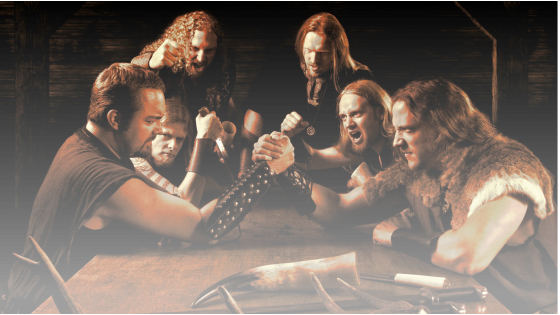 Heidevolk
Heidevolk Friendship is one of the greatest things that we experience in life, and I wholeheartedly agree with Epicurus on the subject, where he's quoted: "Of all the things which wisdom provides to make life entirely happy, much the greatest is the possession of friendship." In fact, Epicurus' words resounded so strongly with how I felt on the matter that I had used it for my 'yearbook quote' in high-school Senior Year.
However, as I reflect on my friendships as a whole; a thought keeps reoccurring: "How well do I actually know my friends?"
I've known my friends for years, but I can't say that I really know them.
We've learned our likes and dislikes, enjoyed one another's company, have been to each others aid, and so on - Yet we've rarely (or in some cases never) talked openly about our ambitions, dreams, beliefs, and so forth.
I believe this stems from current cultural norms - ailments caused by cultural Bolshevism. The idea of materialism that has been so deeply implanted into our minds, that we no longer wish to speak of non-material matters. I'd even go so far as to say that most of us are afraid to speak of anything more celestial than the trivial - and if friends are too afraid to express themselves fully around each other ...then can they really be called friends? I've come to the conclusion that true friendship is nearly dead, and is being replaced with "very-good-acquaintanceship".
This is where intimacy comes into play - or rather, doesn't.
A part of changing society and its culture is changing the meaning of words, and 'intimacy' is one of them. The word 'intimacy' now has a reservation; now something that's related to a strictly romantic sense. Intimacy has been lost in the modern friendship - and in some marriages - due to its current distortion.
Let's looks at some other definitions of the word, shall we?
Intimacy:
When the bonds that hold people together are weakened; it becomes easier to break them. If friendships are held together by profound experiences, a feeling of brotherhood or sisterhood, and a deep understanding of each other - rather than a unidimensional familiarity - it becomes much harder to break those bonds. If the relationships we make in this life are strong, and there's sense of loyalty and kinsmanship about them, then society becomes stronger as a result. We begin to see our towns, cities, counties, and nations as the product of our collective relationships. We begin to have an understanding of the big picture: that we are part of an 'extended family', if you will, and are instilled with a duty to protect and sustain it. Once armed with this understanding, we can then interpret threats to our folk a bit more easily.
How many times have you let your own self-interest outweigh plans or obligations to a friend or family member? How many times have you been the victim of a friend putting their own interests before you?
Can you see where that sense of loyalty has been dismissed? It's easy to be disloyal when you don't truly know the person whom you call 'friend'. Friendship fails when the only thing that defines a friendship is "enjoying things in the company of another person who also enjoys those things".
Social engineers would rather we form "very-good-acquaintanceships" with one another - the reason being that they're easier to break or abandon in the pursuit of our own self-interests. We're more easily controlled whilst drifting with no anchor to hold us to what's important.
While I may not know my friends as well as I'd like, I feel as though I have been blessed to have them in my life - as our friendship is stronger than most others. Sure it's taken quite a bit of work to maintain, but the reward is worth the effort. I've always felt that friends are the family you choose, and I care for them as if they were my brothers.
Now, after having reflected more upon these thoughts, I've made it a point to redouble my efforts concerning the removal of the Bolshevik indoctrination that still afflicts my friends.
How about you?
I've known my friends for years, but I can't say that I really know them.
We've learned our likes and dislikes, enjoyed one another's company, have been to each others aid, and so on - Yet we've rarely (or in some cases never) talked openly about our ambitions, dreams, beliefs, and so forth.
I believe this stems from current cultural norms - ailments caused by cultural Bolshevism. The idea of materialism that has been so deeply implanted into our minds, that we no longer wish to speak of non-material matters. I'd even go so far as to say that most of us are afraid to speak of anything more celestial than the trivial - and if friends are too afraid to express themselves fully around each other ...then can they really be called friends? I've come to the conclusion that true friendship is nearly dead, and is being replaced with "very-good-acquaintanceship".
This is where intimacy comes into play - or rather, doesn't.
A part of changing society and its culture is changing the meaning of words, and 'intimacy' is one of them. The word 'intimacy' now has a reservation; now something that's related to a strictly romantic sense. Intimacy has been lost in the modern friendship - and in some marriages - due to its current distortion.
Let's looks at some other definitions of the word, shall we?
Intimacy:
- a close, familiar, and usually affectionate or loving personal relationship with another person or group.
- an act or expression serving as a token of familiarity, affection, or the like: to allow the intimacy of using first names.
- the quality of being comfortable, warm, or familiar:
When the bonds that hold people together are weakened; it becomes easier to break them. If friendships are held together by profound experiences, a feeling of brotherhood or sisterhood, and a deep understanding of each other - rather than a unidimensional familiarity - it becomes much harder to break those bonds. If the relationships we make in this life are strong, and there's sense of loyalty and kinsmanship about them, then society becomes stronger as a result. We begin to see our towns, cities, counties, and nations as the product of our collective relationships. We begin to have an understanding of the big picture: that we are part of an 'extended family', if you will, and are instilled with a duty to protect and sustain it. Once armed with this understanding, we can then interpret threats to our folk a bit more easily.
How many times have you let your own self-interest outweigh plans or obligations to a friend or family member? How many times have you been the victim of a friend putting their own interests before you?
Can you see where that sense of loyalty has been dismissed? It's easy to be disloyal when you don't truly know the person whom you call 'friend'. Friendship fails when the only thing that defines a friendship is "enjoying things in the company of another person who also enjoys those things".
Social engineers would rather we form "very-good-acquaintanceships" with one another - the reason being that they're easier to break or abandon in the pursuit of our own self-interests. We're more easily controlled whilst drifting with no anchor to hold us to what's important.
While I may not know my friends as well as I'd like, I feel as though I have been blessed to have them in my life - as our friendship is stronger than most others. Sure it's taken quite a bit of work to maintain, but the reward is worth the effort. I've always felt that friends are the family you choose, and I care for them as if they were my brothers.
Now, after having reflected more upon these thoughts, I've made it a point to redouble my efforts concerning the removal of the Bolshevik indoctrination that still afflicts my friends.
How about you?

